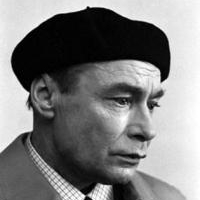Ojārs Vācietis
Ojārs Vācietis | |
|---|---|
 | |
| Born | November 13, 1933 Trapene Parish, Latvia (now Ape Municipality) |
| Died | 28 November 1983 (aged 50) Rīga, Latvian SSR |
| Occupation | poet, writer |
| Nationality | Latvian |
| Genre | Poetry |
| Spouse | Ludmila Azarova |
Ojārs Vācietis (born November 13, 1933 — November 28, 1983) was a Latvian writer and poet. He is often considered one of the most famous and influential poets in the Latvian SSR.[1]
Biography
Ojārs Vācietis was born on November 13, 1933 in Trapene Parish, Latvia. His father Oto Vācietis was a servant. Vācietis studied in Trapane primary school and later in Gaujiena secondary school. 1952 he started Latvian language and literature studies at the University of Latvia. He graduated in 1957. Since 1958 he worked in several Latvian magazines and newspapers (for example: Literatūra un Māksla, Liesma, Draugs). He was also an editor at the Riga Film Studio. In the 1960s he started to question many official ideological dogmas of the Soviet regime in his poems. As a result, he was not allowed to publish from 1960-1966. Some of his works from this period were published for the first time only during the Singing Revolution. However, he was awarded the Latvian SSR State prize in 1967.
He also translated many works from Russian into Latvian.[2] His most famous and still very highly acclaimed translation was M. Bulgakov's Master and Margarita in 1979. He was declared People's writer of Latvian SSR in 1977. Vācietis was married to the Russian poet Ludmila Azarova and their house in Riga, Torņakalns neighborhood has now been transformed into a memorial museum.
Ojārs Vācietis died on November 28, 1983 in Riga. He was buried in Carnikava cemetery.
References
External links
- Биография в Большой советской энциклопедии(in Russian)
- 1933 births
- 1983 deaths
- Soviet writers
- Latvian writers
- Soviet poets
- Latvian poets
- People from Ape Municipality
- University of Latvia alumni
- Soviet translators
- Latvian translators
- Soviet children's writers
- Translators from Russian
- Translators to Latvian
- Communist Party of the Soviet Union members
- Latvian writer stubs
